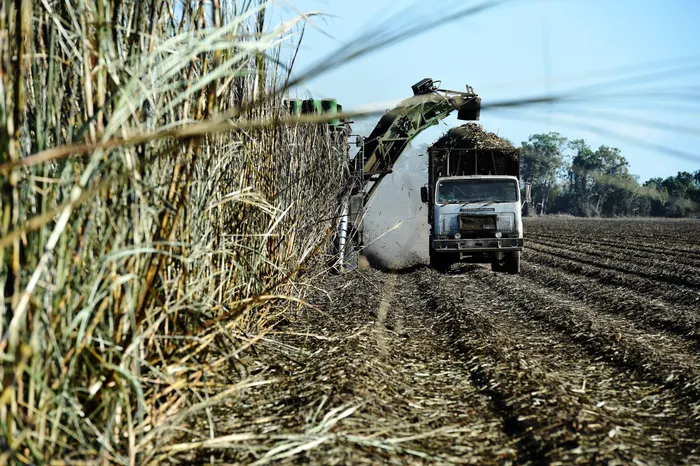Tongaat Hulett meets with staff as financial woes worsen

A harvester loads a truck with sugar cane at a plantation near Ayr, Queensland, Australia. Global sugar prices reached a six-year low in August as rising production levels and exports from countries like Brazil and India has put pressure on prices. Photographer: Carla Gottgens/Bloomberg
Durban - Cash-strapped sugar producer Tongaat Hulett has convened an urgent meeting with employees, who face an uncertain future as the company struggles to stay afloat.
A meeting took place on Thursday and another was scheduled for Tuesday, where the livelihoods of thousands of people was to be discussed, amid the company’s failure to meet its financial obligations.
Among those affected are sugar cane farmers across KwaZulu-Natal, including emerging ones, who supplied their crops to Tongaat Hulett.
The company, which owns vast land in the province, is under business rescue following years of poor financial results as a result of corruption committed by former executives who allegedly “cooked” the books to earn performance bonuses. The seven executives, including former CEO Peter Staude, were charged with fraud and released on bail at the Durban Commercial Court in February. They colluded with external auditors to misrepresent the financial statements for their personal gain.
While the company has been trying to bounce back from the scandal, the situation has not improved. It missed an October 31 deadline to pay about R400million for sugar cane deliveries made in September, after the company failed to secure the funding. Later this week, it managed to pay only small-scale sugar cane farmers.
Andrew Russell, chairperson of the SA Cane Growers Association, confirmed that some small-scale growers supplying the Tongaat Hulett mills at Felixton, Amatikulu and Maidstone had received the overdue payment for cane delivered in September. However, commercial growers had not yet been paid, putting about 14 642 jobs at risk.
Russell said it remained to be seen whether Tongaat Hulett would be able to make timely payments of more than R345m at the end of November for the more than 570000 tons of cane delivered in October. He said if this was not addressed now, the industry might find itself in the same crisis within a few weeks.
“We welcome this development, given the particular financial vulnerability of small-scale grower operations, and are grateful that the business rescue practitioners have understood the urgency of prioritising grower payments to prevent the permanent collapse of their businesses.
“Approximately 300 commercial growers supplied more than half of the cane delivered to Tongaat Hulett in September and they employ the vast majority of the area’s cane farm workers. It, therefore, remains critical that the business rescue practitioners prioritise the payment to these growers, which will enable payments to other value chain participants, including contractors, haulier companies and input suppliers,” he said.
Metis, a business rescue practitioner (BRPs), confirmed that it had met with employees as required in terms of the Companies Act. In response to questions about the meeting, the BRPs said in a statement that, in line with the Labour Relations Act, employees’ rights remain protected during the business rescue process. At this stage, it was not clear whether the company will issue Section 189 letters (voluntary retrenchments).
“The BRPs are scheduled to meet with creditors on Tuesday. In the interim, the BRPs are focusing on stabilising operations while seeking the requisite post-commencement funding. “These are very complex circumstances, and the BRPs are focusing on stabilising the situation, gathering important information, meeting with stakeholders, dealing with critical issues and completing the statutory duties required in terms of the Companies Act.
“The BRPs are working very hard to find the best way forward for those associated with Tongaat. Tongaat’s leadership team is equally committed to working closely with the business rescue practitioners,” said Metis in response to questions
SUNDAY TRIBUNE